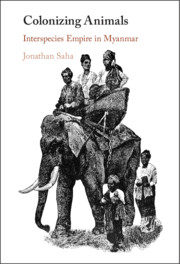'Colonizing Animals relies on the double meaning of its title to resist the racial logics and political ecologies that have made human species domination so foundational to the global imperial project. Rooted in the past and present of Myanmar’s creature worlds, Saha’s book reckons with the possibilities of interspecies histories like no other.'
Antoinette Burton - University of Illinois, Urbana Champaign
'This stunning book makes a novel argument for understanding empire as a thoroughly interspecies enterprise. Through a riveting tracing out of collisions and collaborations between humans and animals in colonial Myanmar it also poses a forceful challenge to lingering Eurocentrism in the writing of both history and animal studies.'
Nayanika Mathur - University of Oxford
'With brilliant theoretical clarity, reach and ambition and with rich and perceptive insights from the past and future which faces Myanmar, Saha mounts a genealogy of the animal and animal studies. This is a genealogy of radical import and wide critical importance. Instead of centring the animal or the marginalized human, Saha attends to the messiness and unruliness of interspecies relations. This allows an original entry-point to long-standing concerns in postcolonial studies as well as Asian and imperial history. A deft intervention which powerfully excavates the current impasse between the social, cultural and economic in animal studies, this book will provide a model for future work, not least for the way in which it eschews an easy emphasis on inclusivity for rigorous attention to capitalism.'
Sujit Sivasundaram - University of Cambridge
‘This book would be an excellent text for courses addressing decolonial/postcolonial studies, animal studies, and historical methodology. Readers would benefit from an introductory foundation in some of the theoretical approaches the text employs … Highly recommended.’
S. M. Weiss
Source: Choice Connect
‘… extensively researched and analytically ambitious … At a time when the ongoing ecological crisis has turned many environmentally attuned scholars into chroniclers of the present, Colonizing Animals asks us to turn toward the past and value animals not in and of themselves.’
Koyna Tomar
Source: H-Environment
‘… Saha presents a convincing argument for the importance of combining ecological and historical research that is very attune to different minority voices across the colonial archive, human and non-human.’
Sabine Hanke
Source: Sehepunkte
‘When read in conjunction with posthumanist and postcolonial theory, Saha’s work offers an important insight for scholars and students, pushing future proponents to embrace multispecies approaches. Moreover, his work challenges histories of colonialism globally to recognize the significant engagements and entanglements of colonizers and the colonized, both human and non human.’
Lloyd Price
Source: Agricultural History



